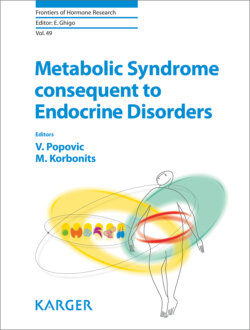Читать книгу Metabolic Syndrome Consequent to Endocrine Disorders - Группа авторов - Страница 23
На сайте Литреса книга снята с продажи.
Thyroxin and Metabolic Phenotype
ОглавлениеUntreated mild or poorly replaced central hypothyroidism (CH) may potentially contribute to adverse cardiometabolic risk. In CH bioactivity of TSH is reduced due to abnormal glycosilation, TSH half-life is longer and thyroid hormones may be within the lower normal range [94]. Patients with untreated GHD may have higher T4 levels since GH replacement increases and GC reduces T4–T3 conversion [93–95]. Estrogen treatment increases thyroid binding globulin and patients may need higher doses of T4 replacement. Recommendations for adequate T4 replacement in CH are based on few reports that suggest direct dosing by weight using mean dose of 1.6 µg/kg targeting TSH below 0.1 mU/L and FT4 in mid to high normal reference range [87]. Patients with CH on empirical T4 doses 1 µg/kg had worse outcome in terms of BMI, total, LDL, and HDL cholesterol than patients on doses 1.6 µg/kg [22].
